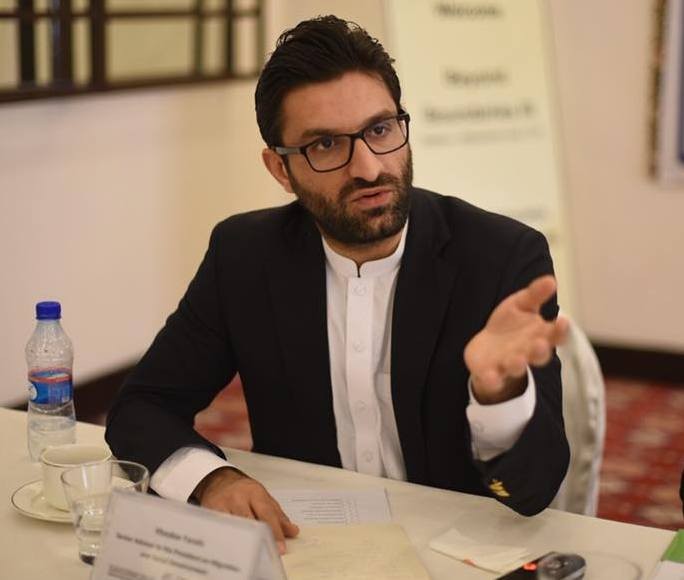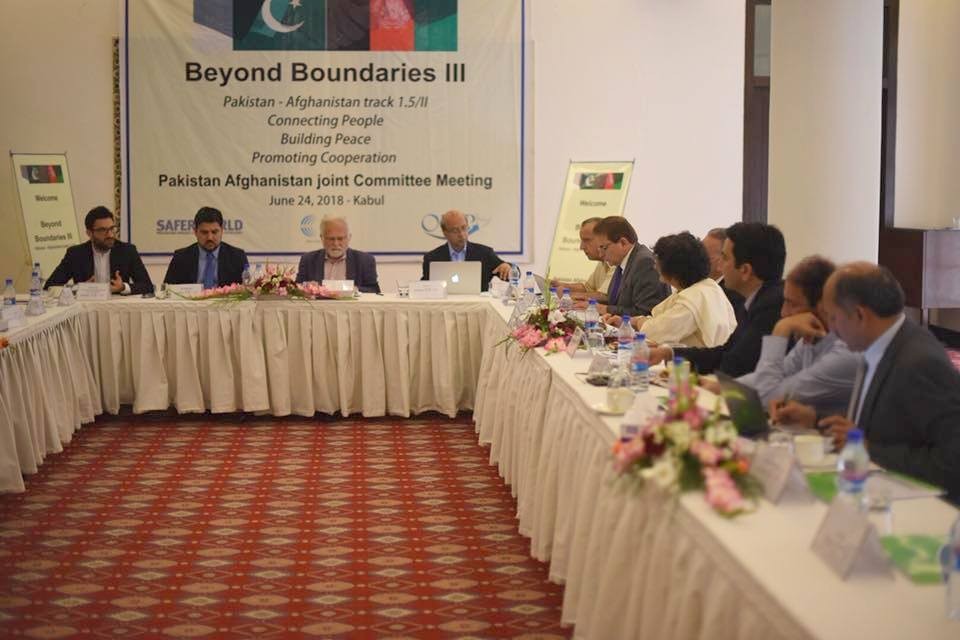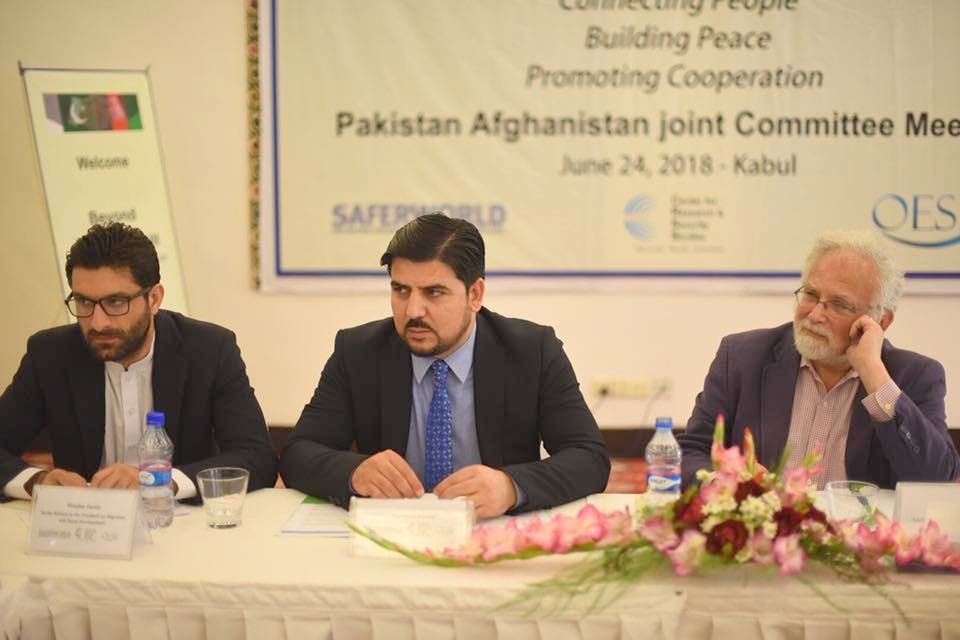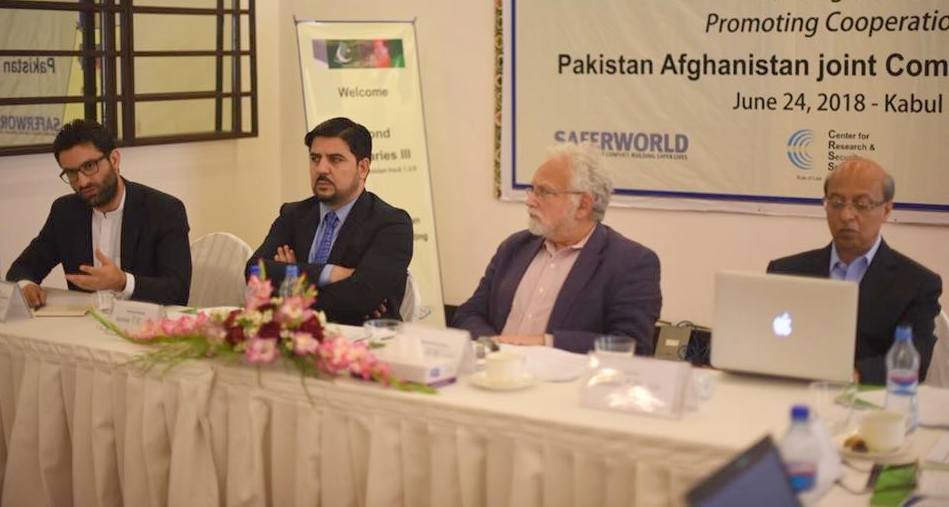The Pakistan and Afghan PAJC held a meeting with the Senior Advisor to President Ashraf Ghani, on Migration & Social Development, Mr. Khyber Farahi, during the PAJC bilateral dialogue on 24 June, at Serena, Kabul. The meeting lasted for about 25 minutes, Mr. Farahi, gave a detailed and comprehensive presentation on the latest on ground situation of Afghan Refugees, as well as on APAPPS framework related to the refugees working group.
The senior advisor to president started his presentation by informing the two delegations that interestingly, he was part of the Afghan government side during the APAPPS negotiations. He said: “it wasn’t by any means easy negotiation, but I do see it as a success. I do see that both countries have realized that the zero sum game is not helping anyone and that both countries will have to come together and work with each other. As there are both risks and opportunities, that both countries can benefit from or be affected, if they don’t come into some common ground on a framework for cooperation. We did go into details of what some of the differences were and concerns were, it will be a long process before trust is revived especially when there are so many factors and so many actors working as spoilers and exploiters. I think in terms of the overall framework, it is a very good document. But a document or a policy is as good as its implementation. So, now both sides need to show some action on their side to make sure that they are serious about this, and there are some signs for an initial trust building process.”
It has been difficult for the government because any talks with the Pakistani side are followed by suspicion at certain levels. The mechanism that has been worked out is to make sure that there are working groups, review processes, and specific actions that can be agreed between the two sides more specifically. “These are some of the factors that I find different about this entire process. Not only are the conditions now conducive for both sides to work with each other, but I also think the approach has been new and unique, as compared to the past. I remain optimistic. I think it won’t be an easy process; clearly it will need time, but the initial signs from the cease fire.” Talking about the usual blame-game, he said: “There has been a huge progress in terms of one side praising Afghan cricket, the other side basically being completely silent as compared to some of the criticism that usually came in the past. So, I think these are good signs to be optimistic about and initial big steps as well”.
Speaking on the refugees issue, he said that an important factor as part of APAPPS clearly was refugees, although for us we have always tried to depoliticize refugees and trade, but in this particular context unfortunately these cannot be separated, they will always be affected. There had been agreements between the two countries in the past as to how to approach the refugee situation, but there was no consistency; intentions between the two governments directly impacted the status and condition of the refugees. We had a huge surge in 2016, luckily it was managed. There was an unprecedented response from the government and not only that, the social networks inside the country also helped to reintegrate them to some extent at least. People thought that this would turn into a catastrophe; there would be a huge conflict. None of that happened, he added.
The Afghan government policy and stance that these are our refugees and they will have to come back to the country at some time is unprecedented and a matter of stability for Afghanistan. This much more important than anything else as part of the bilateral relationship, he said. Instead of holding on to the previous stance, which had been happening for the last 15 years, the Afghan government actually stepped up and changed its stance to bringing them back. “There was the political will which was then translated into policy and action,” he said.
“I will go into some of the details later as to how we are working on some of these pull factors, which is important as part of the bilateral relationship because I think we have to, and we are, grateful to the government of Pakistan, to the nation of Pakistan for hosting Afghan refugees for such a long time”, Mr. Farahi told the delegation.
“I, myself have been a refugee there for nine years and I think many of us around this table on our side have either been refuges or have been there, and I can very openly say that we enjoyed, things got worse in the recent years, but the time when we were there we had every opportunity. It is commendable the way the Pakistani nation embraced us gave us all the opportunities”.
As compared to Iran, the number of Afghans who lived in Pakistan, and had access to opportunities, it helped them get jobs when they returned. Top most qualifications at that time were English language and computers (IT), this was something we all had access to in Pakistan and this helped a great deal for us to start a career coming back to our country. These are all things to be clearly grateful for, he said.
“Now moving forward as a government, we also need to understand that Pakistan has its own challenges. We cannot expect them to keep these refuges forever. So, now while the conditions are not perfectly favorable for huge returns of refugees like this, but there has to be a starting point. And this starts with government trying to prioritize the return and reintegration as part of their policy; and this is exactly what we did,” he noted. “Now, to absorb million plus people, at a time when the poverty rate is at 54 percent, the unemployment is also historic, and more importantly the security situation is impacting everything else, the level of violence is really huge. These are all huge challenges, that will make it difficult to absorb this, but it is nothing impossible,” he reckoned.
Mr. Farahi informed the groups that right after the surge of refugees returning to Afghanistan, the government put together a management framework and an executive committee. There is now a high migration council that is directly chaired by the President, with 17 different ministries and agencies. There is also a committee under the Chief Executive. There is an executive committee – the direct displacement and return committee – it is exceptional in the sense that how it brings the both the humanitarian and development actors together to discuss issues; this has been unprecedented. This forum – this policy framework – was instrumental on how the government basically intends to respond to this. The principle issue is that how we minimize time, so as soon as possible, they can be quickly reintegrated; taking a whole of community approach here is important. As soon as people are back, no status based treatment should be encouraged. We still have people coming back from Pakistan, and there are townships called refugee townships; they are still called refugees in their own country.
He said there is a new government policy to concentrate in the 12 provinces of high return, by use of our national program, like citizen’s charter which is a successor program to the national solidarity program – a way to manage this displacement at the grassroots level through these communities. Because when two communities come together; one that has been there, and the other returning after 15 or 20 years, it requires a direct community engagement and a platform to make sure that displacement is managed at that level. It also involves a lot of economic opportunities in terms of incentivizing these cities to make sure that they can absorb the refugees. “We see the refugees coming back from Pakistan as assets. Now how do we turn them into assets, using their skills and capital requires a concentrated approach, where you work with municipalities, and the private sector more importantly. The government will never be able to create that many jobs. Hence, it will have to be through the private sector. There has been a lot of engagement on how government can actually facilitate creating jobs through the private sector, including regulatory reforms and infrastructural needs,” he said.
Giving specific details, he stated, that municipal level reforms and national reforms are part of a program with the World Bank, a regional grant together with Pakistan, and a land reform is on the way creating land banks with a new procedure for land allocation. “When you look at the five key needs of the refuges it is: land, health, education, jobs, and integration. Different interventions are required by the government on these key needs,” he noted.
Again coming back to APAPPS, he said, the agreement we have with Pakistan under that framework is “We want them back but it has to be manageable, and for that reason we need a time bound repatriation plan in place”. Then, we can on both sides agree when and how they will be returning – some voluntarily, and some involuntarily. As long as we stick to the principles of dignified, safe and manageable return as part of this time bound agreement. This, by the way, was the easiest of all four strands as part of APAPPS to agree on. This was a good start because both countries jointly agreed. And, hopefully after the elections, we will see how the two countries will eventually work to bring them together. Mr. Fahiri ended his presentation with this and opened the floor for questions from the Pakistani delegates.
Referring to the recent extension announced by the GoP till 30th of June, 2018, Mr. Tahir Khan, senior journalist from Pakistan, asked whether there been any talks, consultations to extend this deadline, under APAPPS or otherwise?
Mr. Farahi replied by saying, “We did not get into the details of extensions, because the idea was that the working group on refugees under APAPPS will look into this realistically. But during sideline discussions apart from APAPPS, there are indications that there clearly will be an extension. We do not know about the exact dates, but we will give enough time to Pakistan government for them to plan.”
“There are three categories of Afghan refugees; i) the registered Afghan refugees – POR card holders – which according to UNHCR are about 1.4 million; ii) another 1.5 million refugees who were not registered and were undocumented – but again together with Pakistan a process of registration was started – now they are registered, and have Afghan cards, the Afghan Citizenship Card holders; and iii) about 200,000 who are still undocumented and not registered therefore. We have also been working with the World Bank to increase passport issuance facility and increase the capacity of our embassy and consulates in Pakistan to issue passports promptly. On our side, we hope that within the next year and a half, all of the 2 million can be issued passports,” he elaborated.
Mr. Farahi further said that early this year in January, when the deadline was announced for 31 January for their return, there was chaos on how to deal with such a huge number of refugees within a month. The position of Afghan government was we were more than willing to receive them within a time-frame of 18 months; which will be a realistic time-frame for us. For Afghan refugees who are returning voluntarily, we do not want to put a time-frame on them; we will welcome them back. But, for others, we need a more reasonable and gradual time-frame and process. “I am optimistic that through the APAPPS working groups, and after elections in both the countries, we will have time to plan a realistic time-frame; any practical time-frame will have to be between 12 to 18 months”, he noted.
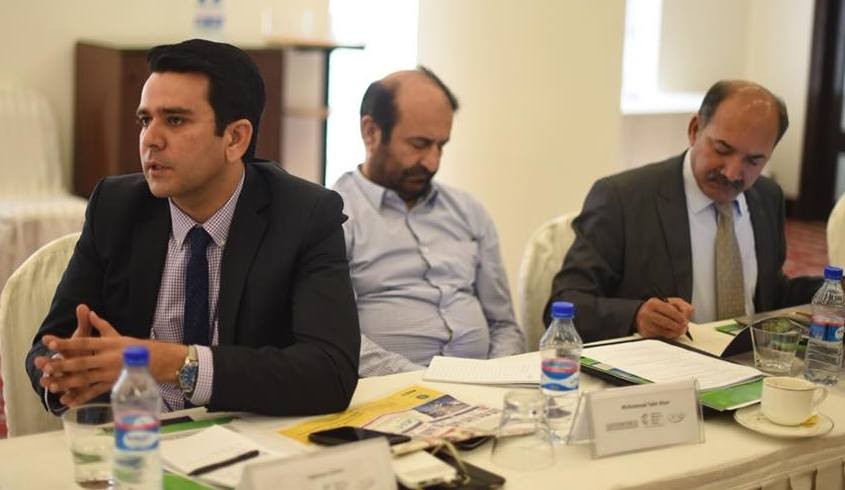 Mr. Rehman Azhar. Senior Journalist from Pakistan group asked that what are the concerns of Afghan government, and what guarantees have been provided by Pakistan government. “We, in this group, have been discussing this issue very passionately and have been lobbying and meeting with SAFRON Minister as well as the foreign office to avert any crisis, and to extend the deadline to a realistic time-frame. Secondly, there is also a feeling that about 3 million refugees are from poor backgrounds, there might be difficulties for Afghan government and for such refugees to resettle. On the Afghan side, are there any ideas whether they are all below the poverty line, or is there a framework of different stratas that you will divide them in,” he asked.
Mr. Rehman Azhar. Senior Journalist from Pakistan group asked that what are the concerns of Afghan government, and what guarantees have been provided by Pakistan government. “We, in this group, have been discussing this issue very passionately and have been lobbying and meeting with SAFRON Minister as well as the foreign office to avert any crisis, and to extend the deadline to a realistic time-frame. Secondly, there is also a feeling that about 3 million refugees are from poor backgrounds, there might be difficulties for Afghan government and for such refugees to resettle. On the Afghan side, are there any ideas whether they are all below the poverty line, or is there a framework of different stratas that you will divide them in,” he asked.
Mr. Farahi replied saying, “We had very focused group discussions with the refugees trying to understand what some of the issues are. I would say there are mainly three issues, one is being broadly addressed which is the treatment issue and there are no cases of ill-treatment. The other issue is the transfer of their assets, which we will be discussed in the working group led by the Ministry of Finance. The refugees who return usually have problems regarding transfer of assets and livestock – this is also something that we are discussing in trade agreements with Pakistan. The third issue is that of documentation, for instance, passports or other documents for owning businesses there, and this is something that we will be addressing through the World Band regional grant program that I earlier spoke of.
Giving more details, the senior advisor said that some of the studies and foreign surveys show that about 70 percent of them are daily wage workers. This is why under the new jobs program, to address this, we have a component called labor intensive. In these labor intensive projects, the government will be prioritizing and particularly focused on addressing this problem. This is because if they are not skilled, and they are daily wage workers, the only way to absorb them is through this labor intensive program, and ,like I said this is something which will be prioritized, which means it starts right away. Other more local economic framework to address the infrastructural needs through the private sector will be a longer process. When I was leading the national solidarity program, we had a functional maintenance and construction cash grant component. It is an on-going program where communities decide on a ratio of 60:40 on projects for labor community infrastructure; creating jobs, beneficiary selection on merit, and a targeting mechanism, selecting the poorest of the poor.
Both the Pakistan and Afghan groups applauded and thanked the senior advisor for taking out time from his busy schedule to meet with them and for presenting such a comprehensive in-depth analysis and presentation.

